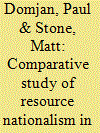| Srl | Item |
| 1 |
ID:
093714


|
|
|
|
|
| Publication |
2010.
|
| Summary/Abstract |
In neighbouring countries like Russia and Kazakhstan, resource nationalism that may look similar to outside observers has a different character and is driven by different circumstances in each state. To assess the underlying nature of state-centric models of resource-led development in the two post-Soviet states, we contrast recent state interventions into their respective resource sectors. In Russia, heightened state involvement in the resource sectors, including oil and gas pipeline networks, is characterised mainly by political goals, whereas Kazakhstan's resource nationalism is primarily motivated by economic goals. More specifically, Russia leverages its energy sector to achieve geopolitical objectives and domestic political stability. By contrast, Kazakhstan seeks widely dispersed economic development.
|
|
|
|
|
|
|
|
|
|
|
|
|
|
|
|
| 2 |
ID:
093717


|
|
|
|
|
| Publication |
2010.
|
| Summary/Abstract |
Until the 2007 Duma election, the Russian polity displayed several characteristics that should have allowed regional leaders to have an impact on deputies: a federalist system, an electoral system that encouraged regional representation, weak political parties, and regional leaders with electoral resources. Recent research on Russian mixed-member Duma elections argues that governors influenced the election of single-member district deputies. This raises the spectre that governors could have influenced the behaviour of these deputies. Using data from the third post-communist Duma, I demonstrate that single-member district deputies backed by regional leaders in the 1999 Duma election behaved differently from others in two critical areas: parliamentary party choice and support for the presidential legislative agenda. Governor support did not, however, affect committee choice.
|
|
|
|
|
|
|
|
|
|
|
|
|
|
|
|
| 3 |
ID:
093716


|
|
|
|
|
| Publication |
2010.
|
| Summary/Abstract |
The article investigates the reasons that led the Bolsheviks to grant autonomous status to South Ossetia in 1922. The conflict between Ossetians and Georgians during the civil war started as a social dispute but rapidly turned into an ethnic confrontation. The Ossetians turned to the Bolsheviks for support, but by 1920 they were defeated and largely expelled from their territory. After the Sovietisation of the region in 1921 the Bolsheviks needed to solve the conflict: the solution adopted was to grant autonomous status. This was not-as is often believed-the result of a divide et impera policy but an attempt at conflict resolution that in the long run satisfied neither side.
|
|
|
|
|
|
|
|
|
|
|
|
|
|
|
|
| 4 |
ID:
093713


|
|
|
|
|
| Publication |
2010.
|
| Summary/Abstract |
Using materials gathered during field work in the penal region in the southwest corner of the Republic of Mordoviya in 2007, the authors examine the official representations of the history of the Mordovan gulag from 1930 to the present day. Through an analysis of the penal authority's institutional newspaper, its museum and anniversary celebrations marking the founding of the Mordovan gulag, the authors argue that a stress in the official history on continuity and tradition of service is evidence of growing confidence of this part of the security apparatus after their loss of status in the 1990s associated with the collapse of the penal economy and negative comment by international monitors and domestic penal reformers.
|
|
|
|
|
|
|
|
|
|
|
|
|
|
|
|
| 5 |
ID:
093715


|
|
|
|
|
| Publication |
2010.
|
| Summary/Abstract |
While the proximate causes of the 2008 Russo-Georgian war have yet to be satisfactorily investigated, an assessment of an earlier occasion of conflict in South Ossetia in 2004 can lay the groundwork for an analysis of the later war. Like the 2008 war, the 2004 conflict was comprehensible on the basis of the ambitious war plans of opposing sides, but it was ultimately rooted in a security dilemma. The conflict thus provides a precedent for considering how a mix of limited offensive intentions, insecurity, uncertainty, and cognitive shortcuts and misperceptions had the capacity to lead to inadvertent war between Russia and Georgia over South Ossetia.
|
|
|
|
|
|
|
|
|
|
|
|
|
|
|
|
| 6 |
ID:
093718


|
|
|
|
|
| Publication |
2010.
|
| Summary/Abstract |
This article examines the transfer of the OECD corporate governance code to Hungary. It documents the process of code transmission, and assesses its impact through an examination of corporate governance in the three largest Hungarian private companies-Magyar Telekom, MOL and OTP. The article illustrates the disjuncture between formal commitment to code adoption and its effective implementation, with a case study of the abortive takeover bid by OMV for MOL in 2007-2008. The reasons for the disjuncture are related to national and corporate contextual conditions, management incentives and the channels of transmission.
|
|
|
|
|
|
|
|
|
|
|
|
|
|
|
|